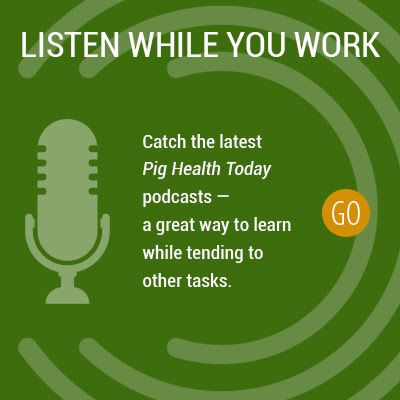What they don’t tell you in veterinary school: Take care of yourself
A romanticized view of the veterinary profession, gleaned from sources like the famous Brit, James Herriot’s novel “All Creatures Great and Small,” doesn’t always mesh with the reality. Veterinarians love animals and want to help them, said Emily Byers, DVM, a veterinarian with Prestage Farms in North Carolina. “But really, we’re in the business of helping people,” she told Pig Health Today. “The animals are our patients.”
That responsibility — and the profession itself — can bring an unhealthy dose of stress.
“At the end of the day, the interaction between animals and humans, whether companion animals or food animals, is all intertwined, and that includes [us],” Byers said. “Those are the things they don’t tell you in vet school.”
Veterinarians learn about “the bugs and drugs” in veterinary school but aren’t as well educated on the stresses involved in the profession.
“We have to learn how to handle those stresses,” she added.
Awareness is first step
Fortunately, veterinarians’ mental, physical and emotional well-being is being acknowledged by the entire veterinary community, Byers said. “We tend to focus on our clients and our patients more than we do on ourselves, so we have a tendency to lack in self-care, just by our nature.”
The time veterinarians devote to patients and clients can turn into long days and stressful situations.
“It can turn into time away from our families, time away from our friends and life outside of work in general,” she said. “We need to learn to recognize and work on self-care as a way to help [us become] more productive for our clients and patients.”
Productive versus negative emotional wellness
The ability to understand, express and fuel emotions is an important step in improving emotional wellness, Byers said. Emotions need to be channeled for a positive or productive outcome rather than a negative effect. She encouraged people to consciously practice positivity and gratitude every day.
For example, if a client’s herd were to break with porcine epidemic diarrhea virus, rather than dwell on the negative factors associated with the break, the veterinarian can take a different approach.
“Instead of allowing your mind to go into that hole, look on it as an opportunity for positivity and gratitude,” Byers said. “Instead, think, ‘Hey, I’m a veterinarian. Today I have the opportunity to put my education to work. This is a bad event and it’s a bad disease, but…I have the privilege and the opportunity to help people,’” she pointed out.
There’s plenty of research showing the power of positivity and positive thinking, Byers said, and when it becomes a daily habit, quality of life improves.
“Instead of seeing challenges, see opportunities,” she said.
Find your tribe
The retention of young veterinarians over the past 5 years has become a concern to the industry. The lifestyle and hours are difficult and burn-out can happen, Byers said. One way to deal with the associated stress is to find your tribe.
“It may be family, it may be counselors, it may be friends or colleagues. But the fact is… we need our tribes,” she said. “Find the people who are in your corner, rooting for you to be successful. Reach out to those people and keep them involved in your life.”
If a person feels he or she is reeling out of control there are emergency entities ready to help, including the National Suicide Prevention Hotline, Byers said. Elizabeth “Betsy” Charles, DVM, with the Veterinary Leadership Institute is another good resource, she noted.
“There’s a wonderful support group through social media called ‘Not One More Vet’ that a lot of veterinarians are becoming familiar with,” Byers added. “It’s a group of veterinarians helping each other.”
Nutrition and exercise
Nutrition and exercise are highly underappreciated and underutilized as factors that can improve mental health, Byers said. “As veterinarians, especially pig veterinarians, we often catch ourselves saying that good nutrition is the best medicine…We say that for our patients so why don’t we look at that for ourselves?”
Nutritional psychology is gaining traction as a field of study. The interaction between foods and the gut microbiome, mental health and emotional health is well-documented, not to mention the physical advantages of a good diet and healthy exercise regimen, she said.
Strive for balance
When Byers was a new graduate of veterinary school, she thought she needed to put in 70 or 80 hours a week as a young veterinarian to show she was “productive,” but she discovered that wasn’t a valid definition of productivity.
“What actually makes us productive is a little bit of hard work, and then all these other things come into play: Taking care of our body, taking care of our mind and our emotions and consciously being positive,” Byers said. “All of that comes together…and makes us better able to serve our patients and our clients.”
Posted on September 30, 2020

















